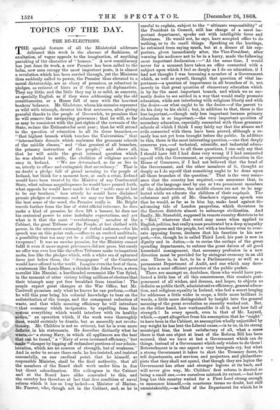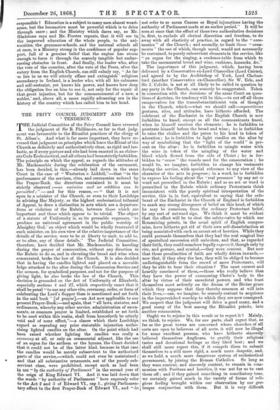TOPICS OF THE DAY.
THE BE-ELECTIONS. THE special feature of all the Ministerial addresses delivered this week is the absence of flashiness, of exultation, of vague appeals to the imagination, of anything partaking of the character of " bounce." A new constituency has just done its work, a new Premier has been called to the helm, new men occupy the most important posts, it is almost a revolution which has been carried through, yet the Ministers thus suddenly called to power, the Premier thus elevated to a moral dictatorship, are as chary of promises, as reluctant in pledges, as reticent of hints as if they were all diplomatists. They say little, and the little they say is as solid, as concrete, as specially English as if they were addressing only the old constituencies, or a House full of men with the heaviest bankers' balances. Mr. Gladstone, whom his enemies represent as wild with triumph, devotes his first sentences, after giving graceful thanks to the people of Greenwich, to promises that he will remove the ratepaying grievance ; that he will, so far as may be consistent with the just rights of the servants of the State, reduce the Estimates for next year ; that...he will attend to the question of education in all its three branches,— " that highest branch which touches the Universities," that "intermediate domain which embraces the grammar schools of the middle classes," and " that greatest of all branches, the primary instruction of the people ;" and above all, that he will settle the great internal question which he was elected to settle, the abolition of religious ascend- ancy in Ireland. " We are determined, as far as lies in us, utterly to efface and extinguish that ascendancy." That is no doubt a pledge full of grand meaning to the people of Ireland, but think for a moment how, at such a crisis, Ireland would have been treated by the Minister of any Continental State, what solemn magniloquence he would have poured forth, what appeals he would have made to that " noble race at last to be our brothers," how utterly he would have disdained prosaic pledges of economy, and we may see how English, in the best sense of the word, the Premier really is. Mr. Bright travels further from the line of strict official reticence, he does make a kind of promise, he does lift a banner, he does use his oratorical power to raise indefinite expectations, and yet what is it that the most " revolutionary " member of the Cabinet, the great Tribune of the People, at last clothed with power, in the uttermost extremity of verbal rashness,—for his speech was on this point rash,—offers to an excited multitude, a possibility that tea may yet be a shilling a pound and sugar twopence ! It was an unwise promise, for the Ministry cannot fulfil it even if more urgent grievances did not press, but surely no offer was ever less like the offers Tribunes make to impatient mobs, less like the pledges which, with a white sea of upturned faces just below them, the " demagogues " of the Continent would have offered to the world. Imagine even the best of them, a statesman like Louis Blanc, a thinker like Jules Favre, a stern moralist like Mazzini, a hardheaded economist like Von Sybel, in the moment of utter victory telling millions of electors that their triumph may yet free breakfast from taxation ! The people expect great changes at the War Office, but Mr. Cardwell promises only what he knows he can perform,—that he will this year bring his colonial knowledge to bear on the redistribution of the troops, and the consequent reduction of waste, and that while securing efficiency he will introduce " that economy which invigorates, by expelling from the system everything which would interfere with its healthy action," an operation which, if the work were thoroughly done, would certainly be drastic, but as assuredly not revolu- tionary. Mr. Childers is not so reticent, but he is even more definite in his statements. He describes distinctly what he wants,—" a strong Navy, in which all appliances are the best that can be found," a "Navy of even increased efficiency," but made " cheaper by lopping off redundant portions of our admin- istration, which are no sources of strength, but of weakness." And in order to secure these ends, he has insisted, and insisted successfully, on one cardinal point, that he himself, as responsible Minister, shall be the final authority, that all the members of the Board shall work under him in due -but direct subordination. His colleagues in the Cabinet and at the Board have alike consented to this, and the country has therefore at last that first condition of naval reform which it has so long lacked—a Minister of Marine. Mr. 'Forster, who, though not in the Cabinet, and, as he is careful to explain, subject to the " ultimate responsibility" of the President in Council, still has charge of a most im- portant department, speaks out with intelligible force and directness. He would not, he says, have accepted office to do, nothing, or to do small things. Speaking on the hustings, he refrained from saying much, but at a dinner of his sup- porters, given immediately after, the Vice-President, after warning his audience not to be in a hurry, made the following most important declaration :—" At the same time, I would never for a moment have taken an office connected with a subject upon which I feel so deeply as I do on education, if I had not thought I was becoming a member of a Government. which, as well as myself, thought that question of vital im- portance—a question of importance in all branches of it, not merely in that great question of elementary education which_ is by far the most important branch, and which we so ear- nestly desire to see settled in a way that would really promote education, while not interfering with religious liberty and with the desire—or what ought to be the desire—of the parent to do his duty to his child ; but, in addition to that, there is the less important,—though only less important because primary education is so important,—the very important question of secondary education, especially connected with those grammar schools of which I think I may fairly say that the abuses and evils connected with them have been proved, although a re- medy has not yet been brought before the public. In addition to this, there is the most interesting question,—one that deeply concerns you,—of technical, scientific, and industrial educa- tion. With regard to all those questions, I can only say that I should have felt I had done very wrong if I had connected myself with the Government, as representing education in the House of Commons, if I had not believed that the head of the Government, and the other members of it, thought as deeply as I do myself that something ought to b3 done upon all those branches of the question." That is the very assur- ance that the country has required,—an assurance that, in spite of the language used by one or two prominent members of the Administration, the middle classes are not to be neg- lected while we educate the children of their employds. The substance and pith of Mr. Goschen's vigorous speech was that he would, as far as in him lay, make head against the advancing tide of London pauperism, which threatens irr the Eastern districts almost to submerge civilization. And finally, Mr. Stansfeld, supposed in remote country districts to be a "Red," whatever that word may mean when applied to English politics, but really a man penetrated by a deep sympathy with progress and the people, but with a tendency even to over- rate opposing forces, declares that his function in his new post,—for, though he is called Third Lord, his post is new in dignity and in duties,—is to revise the outlays of the great spending departments, to enforce the great datum of all good, household management, that necessary profusion in a new direction must be provided for by stringent economy in an old one. There is, in fact, to be a Parliamentary as well as a permanent Department of Audit, and one which may deve- lop into a most efficient protector of the public pocket.
There are amongst us, doubtless, those who would have pre- ferred a little less of all this concreteness, this resolute post- ponement of all wishes, and dreams, and hopes, to objects so definite as public thrift, administrative efficiency, general educa- tion, and religious equality in Ireland, who feel a secret longing for addresses a little wider in scope, a little more brilliant in words, a little more distinguished by insight into the general meaning of the great revolution so recently worked out. But, on the other hand, how workmanlike it all is, and how full of strength 1 In every speech, even in that of Mr. Layard, which,—apart altogether from his assumption that he "ought"- to have been in the Cabinet, an assumption wholly unjustified by any weight he has lent the Liberal cause,—is to us, in its strong municipal bias, the least satisfactory of all, what a sense. there is that one object at least of the Reform Bill has been secured, that we have at last a Government which can do things, instead of a Government which only wishes to do them Retrenchment is in one aspect a very bourgeois cry, but what a strong Government it takes to shut the Treasury doors, to tell departments, and services, and projectors, and philanthro- pists that they shall not spend, that though they are legion the Government has other and stronger legions at its back, and will never give way, Mr. Childers' first reform is decried as being a small one,—we ourselves mistook its extent,—but how long has this country waited for a First Lord strong enough to announce himself,—in courteous terms no doubt, but still unmistakeably,—as Chief of the Department for which he is responsible Education is a subject to many men almost weari- some, but the locomotive must be powerful which is to drive through snow ; and the Ministry which dares say, as Mr. Gladstone says and Mr. Forster repeats, that it will see to, the improved education of the whole people, to the uni- versities, the grammar-schools, and the national schools all at once, is a Ministry strong in the confidence of popular sup- port, full of a genuine belief that the engine has steam enough to force it through the scarcely tangible but embar- rassing obstacles in front. And finally, the leader who, after the vote of the counties, after the vote of the Peers, after the outcry from the English Church, can still calmly say, " As far se lies in us we will utterly efface and extinguish" religious ascendancy in Ireland, is a leader who, with all his calmness and self-restraint, yet knows his power, and knows how deep the obligation lies on him to use it, not only for the repair of that great injustice, but for the commencement of a new, a nobler,' and, above all, a more rapidly advancing era in the history of the country which has called him to her head.



































 Previous page
Previous page